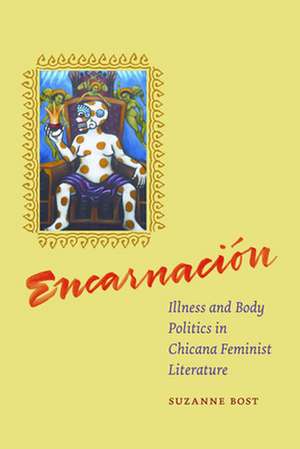Encarnacion – Illness and Body Politics in Chicana Feminist Literature
Autor Suzanne Bosten Limba Engleză Hardback – 14 dec 2009
Preț: 533.03 lei
Preț vechi: 658.07 lei
-19% Nou
Puncte Express: 800
Preț estimativ în valută:
102.01€ • 105.60$ • 86.22£
102.01€ • 105.60$ • 86.22£
Carte tipărită la comandă
Livrare economică 06-20 martie
Preluare comenzi: 021 569.72.76
Specificații
ISBN-13: 9780823230846
ISBN-10: 0823230848
Pagini: 256
Ilustrații: 4 b&w illustrations
Dimensiuni: 152 x 229 x 15 mm
Greutate: 0.52 kg
Editura: Wiley
ISBN-10: 0823230848
Pagini: 256
Ilustrații: 4 b&w illustrations
Dimensiuni: 152 x 229 x 15 mm
Greutate: 0.52 kg
Editura: Wiley
Recenzii
Deeply expressive, intellectually profound, and very moving. It offers new paths into, beside, and through identity politics.-Katie King
Innovative, engaging, and eloquent. Bost's readings of Gloria Anzald a, Cherr e Moraga, and Ana Castillo are groundbreaking.-AnaLouise Keating
"This interdisciplinary, multilayered approach suits this insightful study, which offers a new methodology for understanding Chicana feminism."-Choice
." . . Bost explains the vital ways the intersections of bodies and environments can inform the constitution of individual identities."-Susan C. Mendez, MELUS
Innovative, engaging, and eloquent. Bost's readings of Gloria Anzald a, Cherr e Moraga, and Ana Castillo are groundbreaking.-AnaLouise Keating
"This interdisciplinary, multilayered approach suits this insightful study, which offers a new methodology for understanding Chicana feminism."-Choice
." . . Bost explains the vital ways the intersections of bodies and environments can inform the constitution of individual identities."-Susan C. Mendez, MELUS
Notă biografică
Encarnaci[n takes a new look at identity, following the contemporary movement away from the fixed categories of identity politics toward a more fluid conception of the intersections between identities and communities.The works of Gloria Anzald£a, Cherr¡e Moraga, and Ana Castillo enable us to examine how identities shift and intersect with others through processes of incarnation.Since the 1980s, critics have come to equate these writers with Chicana feminist identity politics. This critical trend, however, has been unable to account, as does Encarnaci[n, for these writers' increasing emphasis on bodies that are sick, disabled, permeable, and, oftentimes, mystical.Concerned equally with the medical-surgical interventions available in our postmodern age and with the ways of understanding bodies in the Native American and Catholic traditions these writers invoke, Encarnaci[n develops a model for identity that expands beyond the boundaries of individual bodies. The book argues that this model has greater utility for feminism than identity politics because it values human variability, sensation, and openness to others.
